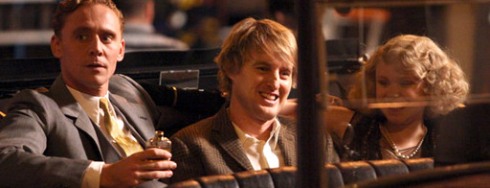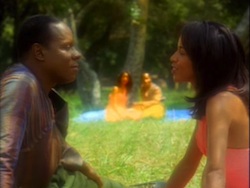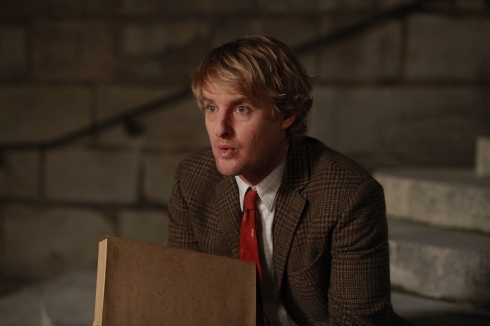The last time a Woody Allen film could be actually be called science fiction, was most certainly his 1973 dystopia /slapstick farce, Sleeper. While I’m sure the prolific writer/director is unconcerned with what genre any of his films fall into (Allen has claimed many of comedies aren’t actually comedies) there is nonetheless something exciting about a Woody Allen romantic comedy futzing around with the notion of time travel.
From the nature of the previews and a few interviews with the stars, it seems like Woody Allen and company want to keep some of the specifics about the time travel in his latest film Midnight in Paris, out this past weekend, under wraps in order to actually surprise the audience. So, if you don’t want to find out what era Owen Wilson time-travels to in Midnight in Paris, stop reading this review now!
Midnight in Paris focuses on a screenwriter and self-described “Hollywood hack” Gil Pender (Owen Wilson) who is vacationing in Paris with his fiancée Inez (Rachel McAdams). Gil has recently decided to give “real literature a shot” and has written a serious novel about a man who owns a nostalgia shop full of trinkets from the past. Gil himself is also a romantic who believes he’d be better off living in Paris during the 1920s, rather than his home era of 2010. Inez, her parents, and some of their traveling companions pooh-pooh Gil’s notions of a bygone era being more pure, and refer to his romanticism as “golden era thinking.” Nonetheless, Gil is taken with Paris and opts to walk the streets at night instead of attending posh functions with Inez and her friends.

Here, another film (even another Woody Allen film) might give us a surrealistic sequence of Gil imagining himself in Paris in the 1920s. Instead, Gil literally time travels to the 1920s. When the clock strikes midnight a vintage roadster appears, and whisks Gil back in time. He immediately meets Zelda (Alison Pill) and Scott Fitzgerald (Tom Hiddleston), Ernest Hemingway (Cory Stole), Pablo Picasso (Marcial Di Fonzo Bo), and more! In the morning the “spell” is seemingly broken, though Gil subsequently returns to the 1920s every night. Later, he even meets Gertrude Stein (Kathy Bates) who agrees to look over the manuscript of his troubled novel. In a later scene, while Stein is encouraging Gil about his novel, she describes it as being “almost like science fiction” insofar as Gil is writing it from a future era different than Stein and the rest of the famous Paris ex-pat Americans.
Through his temporally displaced adventures Gil meets Adriana (Marion Cottilard) a mistress of Picasso who is immediately taken with both Gil and his writing. Adriana reveals to Gil that her favorite time period is Paris in the 1890s and longs to have lived their instead of the 1920s which she sees as “dull.” One night while walking in the 1920s streets, Gil and Adriana encounter a horse and carriage which naturally whisks them to 1890 where they meet Gauguin, Degas and other famous painters at the Moulin Rouge. Adriana is overjoyed and begs Gil that stay with her in 1890, to which Gil painfully tells her he doesn’t belong there, no more than he belongs in 1920. After another pivotal conversation with Gertrude Stein, Gil returns to the present, this time for good.
The best time travel stories often involve an ontological paradox, a musing about when an idea is created and who or what truly influences said idea. Do we make decisions in a linear fashion? If time travel existed, do cause and effect and history truly matter? In Midnight in Paris these questions aren’t addressed as heavily as say the recent season debut of Doctor Who, and yet there are some wonderful time travel gems here. After meeting Adrianna, Gil is wandering present-day Paris and chances upon an old manuscript by Adrianna in which she confesses meeting an American writer named Gil Pender and being in love with him. This is no surrealistic trick here, Gil has actually influenced the past, and in turn that past has influenced his present. All the decisions he makes in the film from that scene forward are informed by the situation his time travel has created.
The other wonderful and subtle commentary in the film involves just how accepting all the historical characters are of Gil in his 1920s (and later 1890s) setting. In a discussion with Man Ray (Tom Corrider) and Salvador Dali (Adrian Brody) both accept his assertion of being a time traveler with no problem. Indeed Man Ray says simply, “Exactly correct. You occupy two worlds simultaneously.”
 And while I’m sure Woody Allen didn’t intend this association, I immediately thought of the first episode of Star Trek: Deep Space Nine in which the aliens in the wormhole tell Captain Sisko that his personality is non-linear and that he seems to “exist” in the past. Am I saying Owen Wilson in a Woody Allen film gave us the exact same theme as Avery Brooks in Star Trek? You bet. The notion that time travel actually reveals our need to stay in the present is a painful message, and one that Midnight in Paris does beautifully.
And while I’m sure Woody Allen didn’t intend this association, I immediately thought of the first episode of Star Trek: Deep Space Nine in which the aliens in the wormhole tell Captain Sisko that his personality is non-linear and that he seems to “exist” in the past. Am I saying Owen Wilson in a Woody Allen film gave us the exact same theme as Avery Brooks in Star Trek? You bet. The notion that time travel actually reveals our need to stay in the present is a painful message, and one that Midnight in Paris does beautifully.
With a fantastic cast, (including a cameo of sorts from France’s first lady Carla Bruni!) Midnight in Paris is a really touching movie all about figuring out one’s place in the universe. And as a special treat, we get to travel through time and meet some of the great literary heroes of the 20th century. Time travel and great literature? What more could one really ask for?
Ryan Britt is a staff writer for Tor.com. He likes Woody Allen movies. Even the “bad ones.”










